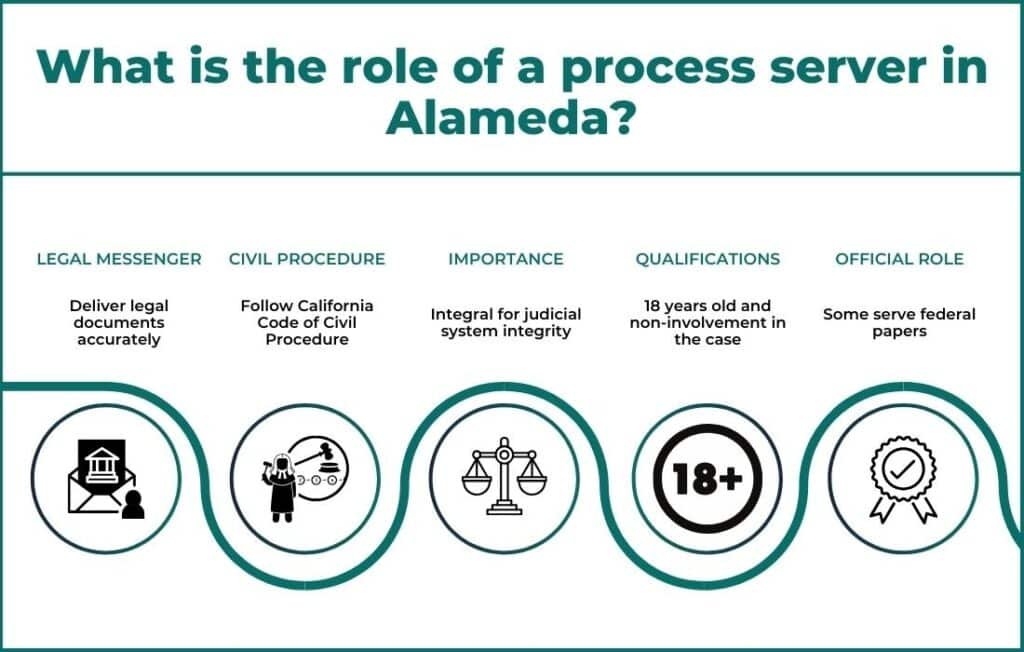Getting your bearings in the legal world can be challenging. Within that system, process servers in Alameda perform a critical function by ensuring that legal documents reach their intended recipients. As a guide, this article explains each step in how does the process server work in Alameda.
Understanding How Process Server Work in Alameda

Process servers in Alameda play a pivotal role in the legal system. They must deliver documents such as subpoenas, complaints, and summonses. Understanding their function is essential for anyone involved in a legal proceeding.
- Legal Messenger: Process servers act as legal messengers, ensuring documents reach the correct parties.
- Civil Procedure: They operate under the California Code of Civil Procedure, which dictates how legal papers must be served.
- Importance: The role of a process server is crucial in maintaining the judicial system’s integrity.
- Qualifications: In Alameda, process servers must be at least 18 years old and not a party to the case.
- Official Role: Some process servers are authorized to serve federal papers, expanding their role beyond the county level.
- Accountability: They provide an impartial third-party record of serving documents essential for legal proceedings.
Initial Steps: How Does a Process Server Get Assigned?
When a legal case is initiated, a process server is usually assigned through a law firm, court, or directly by the plaintiff. This assignment is critical as it sets the legal process into motion. The designated process server then receives all the documents that need to be served.
| Step | Action | Timeframe |
| Assignment Methods | Assigned through law firms, courts, etc. | Immediate |
| First Steps | Review of legal documents | 1-2 Days |
| Client Meeting | Document handover and briefings | Varies |
| Legal Guidelines | Adherence to laws | Immediate |
| Training | Understanding of rules and protocols | Ongoing |
| Documentation | Receive detailed assignment instructions | Immediate |
The Legal Framework: What Laws Govern Process Serving in Alameda?

In Alameda, the California Code of Civil Procedure governs process serving. It is defined by these rules who can serve papers, how papers can be served, and when papers must be served. Ignoring these rules can lead to legal complications.
- California Code: The legal framework for process serving is outlined in the California Code of Civil Procedure.
- County Rules: Alameda may have additional county-specific rules that process servers must adhere to.
- Age Requirement: Individuals must be at least 18 to serve legal documents.
- Authorization: Some process servers serve federal papers and state-level documents.
- Penalties: Failing to adhere to laws can result in fines or the invalidation of the service.
- Legal Updates: Laws governing process service can change; staying updated is crucial.
Methods of Service: From Personal Service to Substitute Service
Different methods serve legal documents, such as personal, substituted, and mail services. Each has its own set of rules, pros, and cons. The choice often depends on the type of case and the recipient’s availability.
- Personal Service: This is the most direct form of service where documents are handed to the individual.
- Substitute Service: If the recipient is unavailable, documents may be left with a competent adult at the residence.
- Mail Service: Certain documents can be served via registered mail.
- Court Approval: Some methods require court approval or must meet specific conditions.
- Technology: Email and electronic service methods are increasingly being accepted.
- Due Diligence: Process servers must exercise due diligence when choosing a method.
Locating the Defendant: The Art of Skip Tracing

Finding the defendant or respondent is an integral part of the process. Techniques such as skip tracing are often employed to locate elusive individuals. Accurate location is vital for the legal process to proceed.
- Skip Tracing: Special databases and social media can be leveraged for tracking down individuals.
- Privacy Laws: Skip tracing must be done within the confines of state and federal privacy laws.
- Time-Sensitivity: Quick and accurate location is crucial, especially in time-sensitive cases.
- Third-Party Services: Some process servers may use third-party services for locating individuals.
- Field Visits: Physical visits to the last-known addresses are a common technique.
- Affidavits: An affidavit may be filed if a defendant proves particularly elusive.
What Happens When the Defendant Cannot Be Found?
Failure to locate the defendant can stall the legal process. Alternative methods like publishing notices in newspapers might be used. This often occurs after exhaustive attempts to find the person have been made.
- Court Instructions: Courts may provide special instructions for serving elusive defendants.
- Publication: Legal notices may be published in newspapers as a last resort.
- Affidavits: Detailed affidavits outlining search efforts must be submitted.
- Time Limits: Courts often set time limits for how long servers must locate the defendant.
- Legal Consequences: Failing to locate a defendant can have profound legal implications.
- Fees: Additional fees may be incurred for extended search efforts.
Timelines and Deadlines: How Fast Does the Process Need to Happen?
Speed is often of the essence in legal proceedings. There are strict timelines for serving papers; missing these can lead to delays or case dismissals. Knowledge of these deadlines is crucial for both the serving and recipient parties.
- Statutory Deadlines: Various documents have their own legally defined timelines for service.
- Extensions: Courts can sometimes grant extensions, but these are exceptions rather than the rule.
- Time Tracking: Process servers often log each attempt at service, noting the time and date.
- Weekend and Holidays: Certain days may not count toward these deadlines.
- Emergency Cases: Some cases may require expedited service.
- Deadline Calculations: Understanding how to calculate deadlines accurately can prevent legal mishaps.
The Proof of Service: Documenting the Process
Proving that the documents were served is a critical component of the legal process. Typically, a proof of service form needs to be completed and submitted. This serves as an official confirmation of the service.
- Form Types: Various proof of service forms exist depending on the document served.
- Notarization: Some proofs require notarization to be considered legally valid.
- Filing: The proof of service must often be filed with the corresponding court.
- Timeframe: There are deadlines for when proof of service must be submitted.
- Online Systems: Some jurisdictions allow electronic submission of these forms.
- Legal Weight: The proof of service is a critical document that may be examined in court.
Common Challenges Faced by Process Servers in Alameda
Process servers can encounter numerous obstacles, from aggressive pets to gated communities. These challenges can slow down or even prevent the successful delivery of documents.
- Safety Risks: Servers can sometimes face aggressive behavior or dangerous situations.
- Accessibility: Gated communities or security protocols can hinder access.
- Legal Restrictions: Some service methods are restricted by laws or community rules.
- Weather Conditions: Weather can impact the ability to serve documents.
- Ethical Dilemmas: Balancing urgency and ethical considerations can be challenging.
- Technology: Lack of technological adoption in some areas can complicate the process.
Your Next Steps: What to Do After Being Served in Alameda
Being served is just the beginning of your involvement in a legal case. Understanding your rights and responsibilities post-service is essential to navigate the legal labyrinth successfully.
- Immediate Actions: Failing to act promptly can have adverse legal implications.
- Legal Counsel: Consulting an attorney is often the recommended next step.
- Case Study: Familiarizing oneself with the case documents is crucial for mounting a defense.
- Court Dates: Keep track of court dates and deadlines to prevent legal blunders.
- Responding: A formal response to the served papers is often required.
- Legal Outcomes: Understanding the potential legal outcomes helps craft a strategy.
Process server work in Alameda to adhere to specific laws and methodologies to ensure the judicial process is fair and equitable. Understanding the intricacies involved—from initial assignment to proof of service—provides a comprehensive view of this crucial role. Individuals can better navigate legal complexities armed with this knowledge.
Ready to initiate the process of serving your needs in Alameda County? Contact the team to schedule process service with Aceso Courier. All the way through, we’ll be here to assist you.
Frequently Asked Questions
How is a Process Server Assigned in Alameda?
Law firms, private entities, or the court system typically assign process servers. Once assigned, they receive all necessary legal documents and specific instructions for service.
What Methods Do Process Servers Use?
Process servers employ several methods, such as personal service, substitute service, or registered mail. Court approval may be required for some methods, depending on the nature of the case and the local laws.
What is Skip Tracing?
Skip tracing is locating a person’s whereabouts for legal document delivery. This often involves databases, public records, and sometimes social media.
How Long Do Process Servers Have to Serve Papers?
Timelines can vary depending on the type of document. Legal deadlines are generally strict, and the case may suffer if they are not met.
What is Proof of Service?
Proof of service is a legal document that confirms the successful delivery of legal papers. This is usually filed with the court and can be critical for the ongoing legal process.
What Challenges Do Process Servers in Alameda Face?
Process servers can face various challenges including, but not limited to, safety risks, accessibility issues, and even weather conditions that can impact their ability to serve papers.










